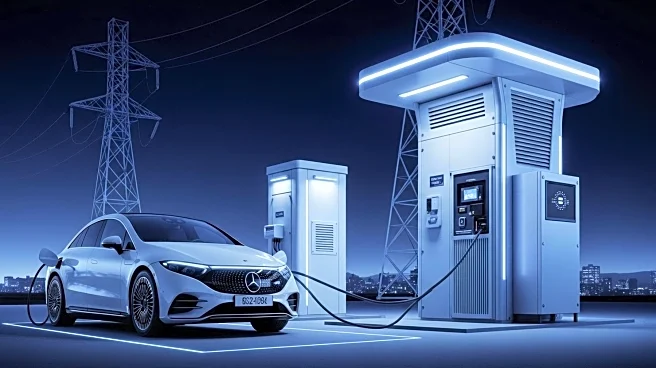What is the story about?
What's Happening?
Mercedes-Benz has officially denied rumors of a potential engine supply agreement with BMW. Markus Schaefer, Chief Technology Officer and member of the Board of Management at Mercedes-Benz Group, clarified that the company will not be using BMW's engines. This statement comes after speculation that Mercedes might adopt BMW's turbocharged 2.0-liter gasoline engine for future models, including compact vehicles and plug-in hybrid versions of the C-Class and E-Class. The rumors suggested that such a collaboration could help reduce development costs and meet upcoming Euro 7 emissions regulations. However, Schaefer emphasized that Mercedes has developed its own Family of Modular Engines (FAME), which are compliant with EU7, China 7, and U.S. regulations. The FAME platform includes a range of engines from four to twelve cylinders, designed to remain relevant as the industry shifts towards electrification.
Why It's Important?
This development is significant as it underscores Mercedes-Benz's commitment to maintaining its engine production in-house, which is crucial for preserving its brand identity and technological independence. By rejecting the use of BMW engines, Mercedes is reinforcing its strategy to balance traditional internal combustion engines with its growing electrification efforts. This decision could impact the competitive dynamics between the two German automakers, as Mercedes continues to innovate within its own engine platforms. The move also highlights the broader industry trend of automakers striving to meet stringent emissions regulations while transitioning to electric vehicles. Mercedes' decision to keep its engine production 'Made in Stuttgart' could influence its market positioning and consumer perception, particularly among those valuing brand heritage and engineering prowess.
What's Next?
Mercedes is expected to continue its focus on electrification while maintaining a robust lineup of internal combustion engines. The company plans to introduce a new high-performance V-8 engine that complies with the strictest emissions standards. Additionally, Mercedes will expand its electric vehicle offerings, as evidenced by the upcoming electric version of the GLC, which will be priced similarly to its combustion counterpart. This dual approach allows Mercedes to cater to diverse consumer preferences and regulatory requirements. The automotive industry will likely watch closely how Mercedes navigates this transition, as it could set a precedent for balancing traditional and electric powertrains.
Beyond the Headlines
The decision to keep engine production in-house may have deeper implications for Mercedes' corporate strategy and supply chain management. By avoiding reliance on external suppliers like BMW, Mercedes can maintain greater control over its technological developments and intellectual property. This approach could also foster innovation within the company, as engineers are encouraged to develop proprietary solutions. Furthermore, the emphasis on in-house production aligns with broader trends in the automotive industry, where companies are increasingly focusing on vertical integration to enhance efficiency and resilience against supply chain disruptions.















